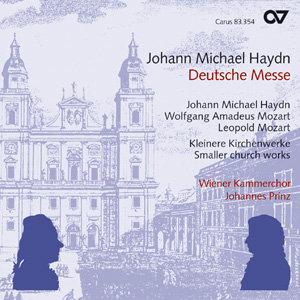
Johann Michael Haydn: Deutsche Messe
This CD presents church music works of J. M. Haydn, W. A. Mozart and L. Mozart, partly with world premiere recordings.
The Court of the Prince-Archbishop of Salzburg can look back on a centuries-old musical tradition. It attained its zenith in the musical culture of Salzburg during the second half of the 18th century through two composers who are being honored for special anniversaries in 2006: Wolfgang Amadeus Mozart (for his 250th birthday) and Johann Michael Haydn (the 200th annniversary of his death). Although the music of the younger Haydn brother was highly regarded by his contemporaries, his music was forgotten in the 19th century and still waits to be rediscovered. One of his more well-known works is the central piece on the present CD, the German Mass “Hier liegt vor deiner Majestät” MH 560 (Here before thy majesty), a work which is musically the epitome of south-German/Austrian Catholicism and which to this day is still a part of church music practice in this region. Wolfgang Amaedeus Mozart is represented on this recording with several smaller, lesser-known works, including the 23-measure motet “God is our Refuge” K. 20, his first setting of a sacred text, which he composed in London at the age of nine. In addition, the CD contains two movements from Leopold Mozart’s C Major Mass, which presents the tradition of the older style of church music. It long was regarded to have been composed by his son.
Purchase
Additional product information
Contents
-
Preface writer
Armin Kircher
| 1966-2015Armin Kircher studied church music at the Mozarteum in Salzburg. Until his death he was Director of the Church Music Department of the Archdiocese of Salzburg, and since 1992 he had been administrative director of the Österreichische Werkwoche für Kirchenmusik (Austrian Week for Church Music). He was also Director of Music at St Peter's Abbey, Salzburg and organist at the Cajetan Church in Salzburg. The collections he edited for the Catholic liturgy have become established standard works, in particular the choral collections Chorbuch Mozart • Haydn, the Chorbuch Kirchenjahr (Choirbook for the Church Year) and publications for organ and choir for the new Catholic hymnbook Gotteslob. Armin Kircher also made a name as an arranger of beautiful settings for choir and organ. Personal details
-
Ensemble
Wiener Kammerchor
-
Conductor
Johannes Prinz
-
Soloist - organ
Robert Kovács
| 19762004-2006 Stiftorganist in St. Florian / OÖ, Domorganist in Eisenstadt und Referent für Kirchenmusik der Diözese Eisenstadt Personal details
Reviews
[...] Mit feinster dynamischer Nuancierung und perfekter Intonation werden die Motetten dargeboten, etwa das bekannte ‚Tenebrae factae sunt'. Wiederum gelingt dem Wiener Kammerchor eine Referenzeinspielung. [...]
Dr. Franz Gratl
klassik.com, 01.10.2006
Frequent questions about this work
 There are no questions and answers available so far or you were unable to find an answer to your specific question about this work? Then click here and send your specific questions to our Customer Services!
There are no questions and answers available so far or you were unable to find an answer to your specific question about this work? Then click here and send your specific questions to our Customer Services!





